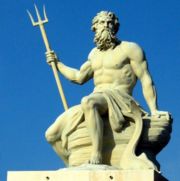Poseidon
 From Conservapedia - Reading time: 2 min
From Conservapedia - Reading time: 2 min
This article is about the Greek god. For the United States Navy missile, see UGM-73 Poseidon.
Poseidon, (Greek: Ποσειδών; Spanish: Poseidon) also called Neptune by the Romans, is the god of the sea in ancient Greek mythology. Poseidon is one of the most anciently worshipped gods in the Greek pantheon.
Following the overthrow of the Titans, the sons of Kronos, drew lots; Poseidon was granted dominion over the sea, and over earthquakes and horses, while Zeus was granted dominion over the sky, and Hades dominion over the underworld. Sailors often prayed to Poseidon for safe journeys, and in mythology failure to pay heed to Poseidon would lead to disastrous travel. In The Odyssey, Odysseus (also called Ulysses by the Romans) attacks the Cicones, a favored tribe of Poseidon, and blinds Polyphemus, a Cyclops and son of Poseidon. As a result, Poseidon causes storms that blow Odysseus off course, and through a series of misadventures, caused him not to return home for 20 years.
In Greek mythology, Poseidon is associated with dolphins, fishes, Gigantes, Cyclopes and tridents. He lived in a palace on the ocean floor, made of coral and gems. His chariot is pulled by a Hippocamp, or horses that could ride on the sea. [1]
See also[edit]
External links[edit]
| ||||||||||||||||||||||||||
| ||||||||||||||||||||
 KSF
KSF
